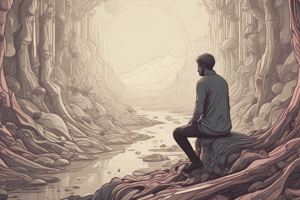Podcast
Questions and Answers
What are the three attributional dimensions in the revised theory of learned helplessness?
What are the three attributional dimensions in the revised theory of learned helplessness?
- Internal-External, Stable-Unstable, Global-Specific
- Personal-Universal, Chronic-Acute, General-Particular
- Positive-Negative, Long-Term-Short-Term, Broad-Narrow
- Internal-External, Stable-Unstable, Global-Specific (correct)
How do the three attributional dimensions in the revised theory of learned helplessness, namely internal-external, stable-unstable, and global-specific, contribute to individuals' explanations of uncontrollable outcomes?
How do the three attributional dimensions in the revised theory of learned helplessness, namely internal-external, stable-unstable, and global-specific, contribute to individuals' explanations of uncontrollable outcomes?
- Determines personal or universal helplessness (& accordingly self blame)
- STABLE UNSTABLE DIMENSION: Determines 'chronicity' (persistence)
- GLOBAL SPECIFIC DIMENSION: Determines generalisability to new situations
- All of the above (correct)
According to the depressive realism hypothesis, depressed college students tend to be more __________ in making judgments about their performance in an experimental task.
According to the depressive realism hypothesis, depressed college students tend to be more __________ in making judgments about their performance in an experimental task.
Accurate (realistic)
What are the three types of distortion proposed by Beck's cognitive theory of depression?
What are the three types of distortion proposed by Beck's cognitive theory of depression?
Beck's cognitive theory of depression proposes that depressed individuals have negative __________ about themselves, the __________, and __________.
Beck's cognitive theory of depression proposes that depressed individuals have negative __________ about themselves, the __________, and __________.
According to Beck's cognitive theory of depression, what are the negative schemas that depressed people have?
According to Beck's cognitive theory of depression, what are the negative schemas that depressed people have?
The hopelessness theory of depression is based on the theory of __________ __________.
The hopelessness theory of depression is based on the theory of __________ __________.
According to the positive illusions theory, how do mentally healthy people and depressed patients differ in their perception of reality?
According to the positive illusions theory, how do mentally healthy people and depressed patients differ in their perception of reality?
Who is a strong advocate of attributional retraining for both success and happiness?
Who is a strong advocate of attributional retraining for both success and happiness?
According to the document, which theory assumes that depressed people generalize inappropriately from situations with uncontrollable outcomes to situations with controllable outcomes?
According to the document, which theory assumes that depressed people generalize inappropriately from situations with uncontrollable outcomes to situations with controllable outcomes?
According to the positive illusions theory, mentally healthy individuals tend to distort reality and view the world through __________-tinted glasses.
According to the positive illusions theory, mentally healthy individuals tend to distort reality and view the world through __________-tinted glasses.
The revised theory of learned helplessness suggests that some people have a depressive attributional style, characterized by giving 'internal, stable, global' attributions for __________ outcomes.
The revised theory of learned helplessness suggests that some people have a depressive attributional style, characterized by giving 'internal, stable, global' attributions for __________ outcomes.
The revised theory of learned helplessness suggests that some people have a depressive attributional style, characterized by giving 'external, unstable, specific' attributions for __________ outcomes.
The revised theory of learned helplessness suggests that some people have a depressive attributional style, characterized by giving 'external, unstable, specific' attributions for __________ outcomes.
Study Notes
Attributional Dimensions of Learned Helplessness
- The revised theory of learned helplessness proposes three attributional dimensions: internal-external, stable-unstable, and global-specific.
- These dimensions contribute to individuals' explanations of uncontrollable outcomes, influencing their perceptions of causality and control.
Depressive Realism Hypothesis
- According to the depressive realism hypothesis, depressed college students tend to be more realistic in making judgments about their performance in an experimental task.
Beck's Cognitive Theory of Depression
- Beck's cognitive theory of depression proposes three types of distortion: negative self-schemas, negative world-views, and negative future expectations.
- Depressed individuals have negative schemas about themselves, the world, and the future.
- These negative schemas lead to distorted thinking patterns, perpetuating depressive symptoms.
Hopelessness Theory of Depression
- The hopelessness theory of depression is based on the theory of learned helplessness.
Positive Illusions Theory
- According to the positive illusions theory, mentally healthy people and depressed patients differ in their perception of reality, with mentally healthy individuals distorting reality and viewing the world through rose-tinted glasses.
Attributional Retraining
- Martin Seligman is a strong advocate of attributional retraining for both success and happiness.
Theory of Depressive Attributional Style
- The revised theory of learned helplessness assumes that depressed people generalize inappropriately from situations with uncontrollable outcomes to situations with controllable outcomes.
- Depressed individuals have a depressive attributional style, characterized by giving 'internal, stable, global' attributions for negative outcomes.
- Conversely, they give 'external, unstable, specific' attributions for positive outcomes.
Studying That Suits You
Use AI to generate personalized quizzes and flashcards to suit your learning preferences.
Description
Test your knowledge on the three attributional dimensions in the revised theory of learned helplessness. Explore and understand how internal, stable, and global attributions affect learned helplessness.



